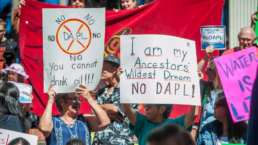A court’s decision against Greenpeace threatens all activist organizations.
By David Helvarg, The Progressive
If you remember the Standing Rock protest encampment against the Dakota Access Pipeline, which lasted from 2016 into 2017 and was met with a harsh winter of political suppression, you might also remember that the movement was visibly and powerfully led by Indigenous water protectors from the Sioux tribe.
These protests—which remained largely non-violent in the face of hostile local law enforcement and corporate-hired “private security”—were led by the Standing Rock Sioux, whose lands and treaty rights were endangered by the pipeline. The federal government approved the pipeline route without adequately consulting tribal members, in violation of the tribe’s treaty rights.
The protests drew thousands of Native Americans, inspired Indigenous youth and other supporters (including Robert F. Kennedy Jr.) and set off a revival of Indigenous empowerment in the United States that has carried through the COVID-19 pandemic—when many reservations closed access to outsiders as a protective measure—and on to today. We’re now in the midst of increased visibility for Indigenous art, films, culture, television shows, reclamation, as well as a push for emerging political leadership and co-management of lands and waters within the Native American community. This included, under the Biden Administration, the first Indigenous Secretary of Interior, Deb Haaland, and the first Alaska Native elected to Congress, Mary Peltola.

But in spite of this groundswell of Indigenous activism, a North Dakota jury decided on March 19 that the environmental and climate action group Greenpeace should pay more than $660 million for damages and defamation to Energy Transfer LP, a Texas-based pipeline company that completed the Dakota Access Pipeline pipeline in 2017. Energy Transfer, whose CEO was a major supporter of President Donald Trump’s 2024 campaign, claims that Greenpeace agitated against the completion of the crude oil pipeline by paying and training protestors, as well as providing them supplies to form a blockade.
It’s hard to believe that, in the midst of the global climate emergency and decades-long disinformation campaign surrounding it, anyone can actually defame the fossil fuel industry. It would be like Vladimir Putin suing Alexei Navalny’s family for defaming him by saying Navalny was murdered in prison.
Greenpeace, of course, does not have hundreds of millions in spare cash to pay out. But the aim of this successful legal action, known as a Strategic Lawsuit Against Public Participation (SLAPP) suit, has less to do with enriching the nation’s largest pipeline company, which generated more than $82 billion in revenue last year, than with suppressing voices of dissent.
Recent Posts
How to Organize Safely in the Age of Surveillance
February 22, 2026
Take Action Now From threat modeling to encrypted collaboration apps, we’ve collected experts’ tips and tools for safely and effectively building a…
‘The Siege Must Be Broken’: Countries Called to Ship Fuel to Cuba After Trump Tariffs Struck Down
February 21, 2026
Take Action Now The US Supreme Court’s ruling “implies that Trump’s recent order imposing tariffs on countries selling oil to Cuba exceeds the…
Elite Depravity in Imperial Decline, A Zero Hour Conversation With Richard Wolff
February 20, 2026
Take Action Now “The system self-selects for psychopathy… the most sociopathically obsessive competitor and accumulator of personal power and…
Economics of Health For All: The Plan to Put Health at the Heart of the Global Economy
February 20, 2026
Take Action Now At the World Health Assembly in May, member states may endorse an unprecedented strategy declaring that health is not a cost – but…




